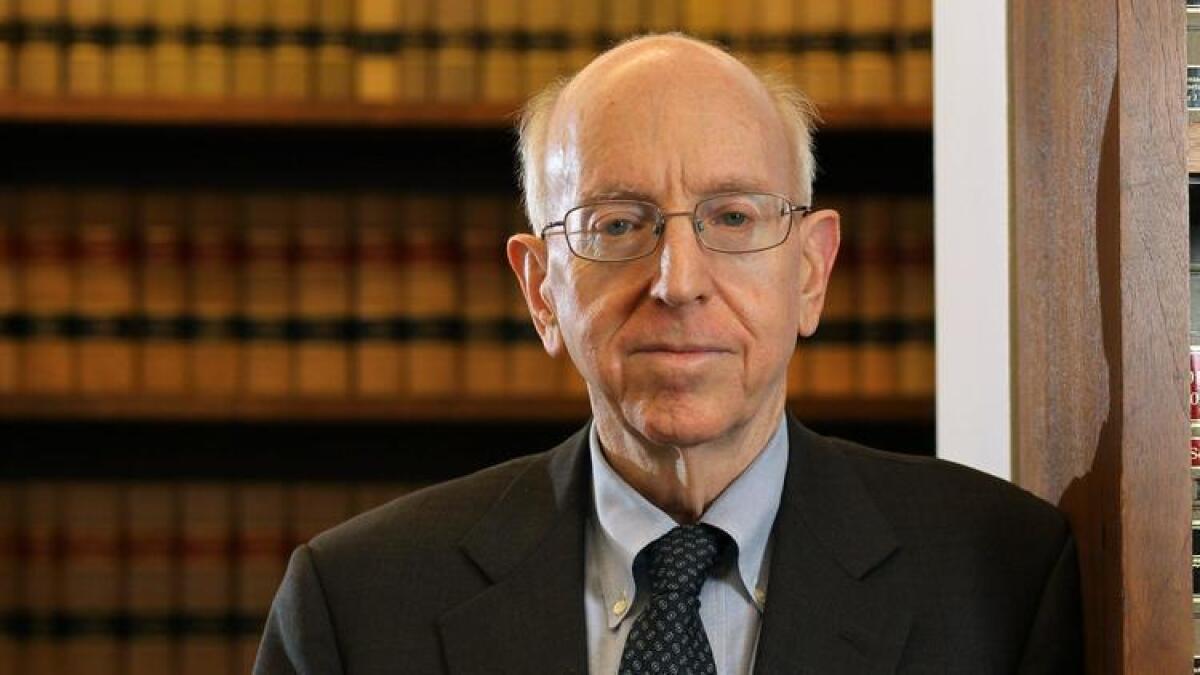Richard Posner, acerbic legal mind, retires from federal appeals court in Chicago

Reporting from CHICAGO — Judge Richard A. Posner, one of the nation’s leading appellate judges, whose acerbic wit attracted an almost cultlike following within legal circles, is retiring after more than three decades with the 7th U.S. Circuit Court of Appeals in Chicago.
Posner, 78, who stepped down effective Saturday, was appointed to the court by President Reagan in 1981 and served as its chief judge from 1993 to 2000.
Posner said in a statement he has written more than 3,300 opinions in his time on the bench and is “proud to have promoted a pragmatic approach to judging.” He said he spent his career applying his view that “judicial opinions should be easy to understand and that judges should focus on the right and wrong in every case.”
Posner’s biting and often brilliant written opinions as well as his unrelenting questioning from the bench have made him an icon of the court for years.
Known as a conservative at the time of his appointment, Posner’s views skewed more libertarian through the years, and he often came down in favor of more liberal issues such as gay marriage and abortion rights.
Lawyers who regularly appeared before the 7th Circuit knew that when Posner was on a panel they had to be ready for a line of questioning that could come out of left field. The salty judge was known to abruptly cut off lawyers who he thought were off-point, often with a dismissive “No, no, no!” delivered in his trademark nasal tone.
“He’s a brilliant man who seems to relish in a vigorous dialogue with counsel, even if it didn’t always seem to be directly related to the case,” said Ronald Safer, a former federal prosecutor and now a partner at Riley, Safer, Holmes & Cancila. “You are always on edge and you have to be at your sharpest whenever he is on the bench.”
Posner seemed to be well aware of his image and never backed down from it. In a 2001 profile in The New Yorker, he described himself as having the same personality traits as his beloved cat, Dinah: “playful, but with a streak of cruelty.”
He’s also been an outspoken critic of the current state of the U.S. Supreme Court, telling a Hyde Park gathering in an appearance last year that he thought the country’s high court was “awful” and the result of a process that had become too political.
“I think it’s reached a real nadir,” Posner said at the Seminary Co-Op Bookstore. “Probably only a couple of the justices, [Stephen] Breyer and [Ruth Bader] Ginsburg, are qualified. They’re OK, they’re not great.”
Posner was also in the headlines in 2012 when Justice Antonin Scalia accused him of lying about the justice’s new book in a review published in The New Republic.
In the review, Posner had accused Scalia of deviating from his own strict, text-based approach to interpreting law when he struck down a District of Columbia handgun ban in 2008 by considering the legislative history behind the law.
Scalia responded to the review by saying, “To say that I used legislative history is simply, to put it bluntly, a lie.”
Posner at the time declined to comment.
Judge Diane Wood, the chief of the 7th Circuit, said in a statement Friday that Posner is one of the “leading public intellectuals” in the world whose impact “is immeasurable.”
“His opinions have had an impact around the world,” Wood said. “He has produced an unparalleled body of scholarship — books, articles and public commentary — covering virtually every legal topic that can be imagined.”
Born in New York, Posner grew up with a left-wing mother who had many radical friends, including a couple who adopted the children of Julius and Ethel Rosenberg, the executed Russian spies, according to a Tribune Magazine profile in 2000. Posner has said he once gave away his train set to the Rosenberg kids.
He clerked for U.S. Supreme Court Justice William J. Brennan Jr. and in 1965 became the assistant to Thurgood Marshall, the future Supreme Court justice who was then the U.S. solicitor general.
Despite his old-school demeanor, Posner was a hit among young lawyers and law students who often quote his opinions and writings on social media. He even inspired a Twitter profile called “Posner Thoughts” that offered mock musings by the judge on topics including immigration policy, the Supreme Court and more.
Meisner and O’Connell write for the Chicago Tribune.
ALSO
Trump could pay a price if he hands out pardons in the Russia probe as he did for Joe Arpaio
No longer on a pedestal: New York debates Christopher Columbus statues and the explorer’s legacy
After Harvey, Texas rallies to rescue cats and dogs, with lessons learned from Hurricane Katrina
More to Read
Sign up for Essential California
The most important California stories and recommendations in your inbox every morning.
You may occasionally receive promotional content from the Los Angeles Times.










